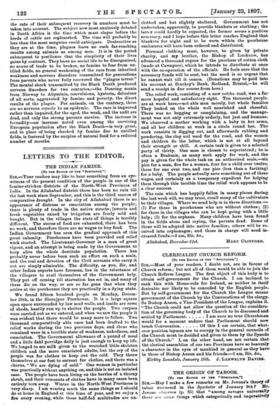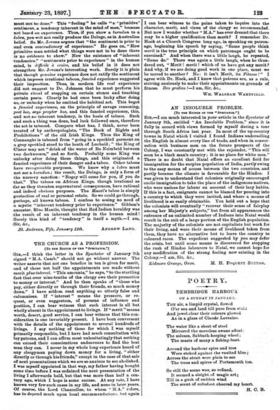THE ORIGIN OF TABOOS.
[To THE EDITOR OF TEl " Spzer.roB.1 SIR,—May I make a few remarks on Mr. Jevons's theory of taboo discussed in the Spectator of January 9th P Mr. Jevons observes (p. 85) that "among savages universally there are some things which categorically and imperatively
must not be done." This "feeling" he calls "a primitive' sentiment, a tendency inherent in the mind of man," because not based on experience. Thus, if you show a turndun to a lubra, you will not really produce the Deluge, as in Australian belief. So Mr. Jevons argues that "the sentiment is prior to and even contradictory of experience." He goes on, "How primitive man settled what things were not to be done there is no evidence to show." Now the existence of "inherent -tendencies," "sentiments prior to experience" in the human mind, is difjicile a croire, and his belief in it does not strengthen Mr. Jevons's interesting work. Surely it is plain that though genuine experience does not ratify the sentiment which imposes irrational taboos, fancied experience suggested their imposition. Thus, in modern life real experience .did not suggest to Dr. Johnson that he must perform his private ritual of stepping on certain stones and touching tertian posts. Clearly he had once been lucky after doing -SO, or unlucky when he omitted the habitual act. This begot a fancied experience, on the principle of savage reasoning, post hoc, ergo propter hoe, and this fancied experience, this, and not au inherent tendency, is the basis of taboos. Such and such a thing was done, bad luck followed once, therefore the act is tabooed. Compare what has, I think, never been treated of by anthropologists, "The Book of Rights and Prohibitions" of the old Irish Kings, Thus the King of 4Jonnaught is tabooed from "going in a speckled garment on a grey speckled steed to the heath of Luchaid ; " the King of Ulster may not "drink of the water of Bo Neimbrid between two darknesses," and so forth. Probably some King was unlucky after doing these things, and this originated a -fancied experience of their danger and a taboo. Other taboos have recognisable purposes.- We know why a lubra must not see a turndun ; the result, the Deluge, is only a form of the nursery sanction : "Bogey will come for you, if you do that." The taboos on African Kings, though irrational as ifar as they threaten supernatural consequences, have rational and indeed obvious purposes. The Maori's taboo is simply protection of real or personal estate. So we could go through, perhaps, all known taboos. I confess to seeing no need of a mystic "inherent tendency prior to experience." Gibbon's -ancestor. Blue Mantle, thought that Red Indian heraldry was the result of an inherent tendency in the human mind ! Sorely this kind of " tendency " is itself a myth.—I am, Sir, So., agf. Andrews, Fife, January 12th. ANDREW LANG.



































 Previous page
Previous page